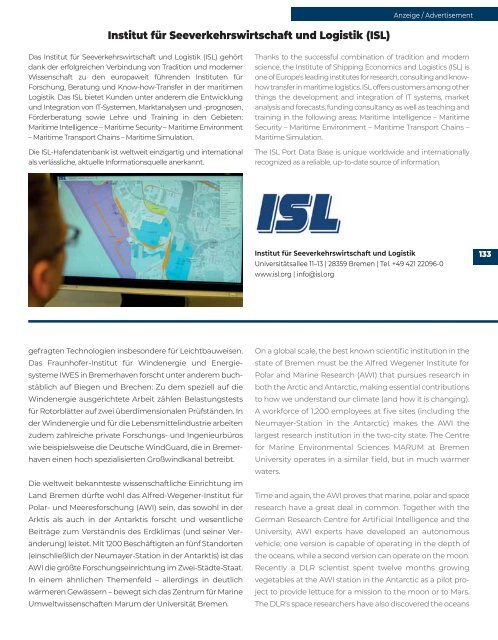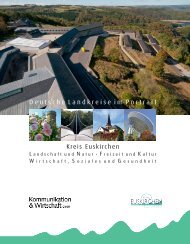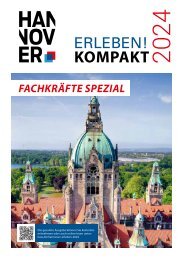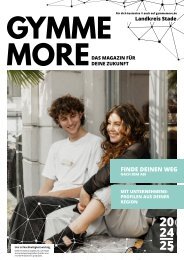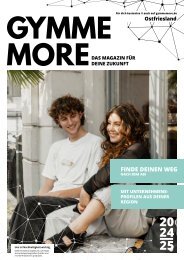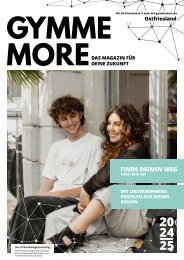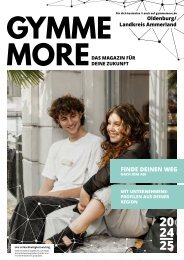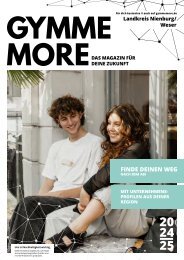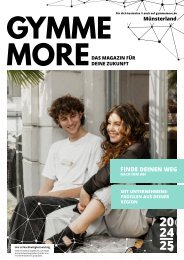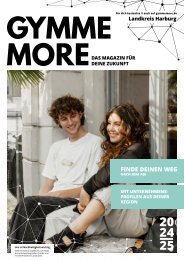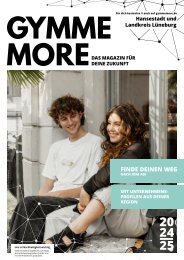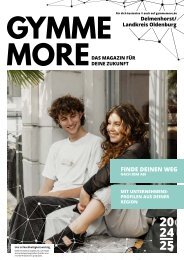Bremen bewegt 2019
Sie wollen auch ein ePaper? Erhöhen Sie die Reichweite Ihrer Titel.
YUMPU macht aus Druck-PDFs automatisch weboptimierte ePaper, die Google liebt.
Anzeige / Advertisement<br />
Institut für Seeverkehrswirtschaft und Logistik (ISL)<br />
Das Institut für Seeverkehrswirtschaft und Logistik (ISL) gehört<br />
dank der erfolgreichen Verbindung von Tradition und moderner<br />
Wissenschaft zu den europaweit führenden Instituten für<br />
Forschung, Beratung und Know-how-Transfer in der maritimen<br />
Logistik. Das ISL bietet Kunden unter anderem die Entwicklung<br />
und Integration von IT-Systemen, Marktanalysen und -prognosen,<br />
Förderberatung sowie Lehre und Training in den Gebieten:<br />
Maritime Intelligence – Maritime Security – Maritime Environment<br />
– Maritime Transport Chains – Maritime Simulation.<br />
Die ISL-Hafendatenbank ist weltweit einzigartig und international<br />
als verlässliche, aktuelle Informationsquelle anerkannt.<br />
Thanks to the successful combination of tradition and modern<br />
science, the Institute of Shipping Economics and Logistics (ISL) is<br />
one of Europe's leading institutes for research, consulting and knowhow<br />
transfer in maritime logistics. ISL offers customers among other<br />
things the development and integration of IT systems, market<br />
analysis and forecasts, funding consultancy as well as teaching and<br />
training in the fol lowing areas: Maritime Intelligence – Maritime<br />
Security – Maritime Environment – Maritime Transport Chains –<br />
Maritime Simulation.<br />
The ISL Port Data Base is unique worldwide and internationally<br />
recognized as a reliable, up-to-date source of information.<br />
Institut für Seeverkehrswirtschaft und Logistik<br />
Universitätsallee 11–13 | 28359 <strong>Bremen</strong> | Tel. +49 421 22096-0<br />
www.isl.org | info@isl.org<br />
133<br />
gefragten Technologien insbesondere für Leichtbauweisen.<br />
Das Fraunhofer-Institut für Windenergie und Energie -<br />
systeme IWES in Bremerhaven forscht unter anderem buchstäblich<br />
auf Biegen und Brechen: Zu dem speziell auf die<br />
Windenergie ausgerichtete Arbeit zählen Belastungstests<br />
für Rotorblätter auf zwei überdimensionalen Prüfständen. In<br />
der Windenergie und für die Lebensmittelindustrie arbeiten<br />
zudem zahlreiche private Forschungs- und Ingenieurbüros<br />
wie beispielsweise die Deutsche WindGuard, die in Bremerhaven<br />
einen hoch spezialisierten Großwindkanal betreibt.<br />
Die weltweit bekannteste wissenschaftliche Einrichtung im<br />
Land <strong>Bremen</strong> dürfte wohl das Alfred-Wegener-Institut für<br />
Polar- und Meeresforschung (AWI) sein, das sowohl in der<br />
Arktis als auch in der Antarktis forscht und wesentliche<br />
Beiträge zum Verständnis des Erdklimas (und seiner Ver -<br />
änderung) leistet. Mit 1200 Beschäftigten an fünf Standorten<br />
(einschließlich der Neumayer-Station in der Antarktis) ist das<br />
AWI die größte Forschungseinrichtung im Zwei-Städte-Staat.<br />
In einem ähnlichen Themenfeld – allerdings in deutlich<br />
wärmeren Gewässern – <strong>bewegt</strong> sich das Zentrum für Marine<br />
Umweltwissenschaften Marum der Universität <strong>Bremen</strong>.<br />
On a global scale, the best known scientific institution in the<br />
state of <strong>Bremen</strong> must be the Alfred Wegener Institute for<br />
Polar and Marine Research (AWI) that pursues research in<br />
both the Arctic and Antarctic, making essential contributions<br />
to how we understand our climate (and how it is changing).<br />
A workforce of 1,200 employees at five sites (including the<br />
Neumayer-Station in the Antarctic) makes the AWI the<br />
largest research institution in the two-city state. The Centre<br />
for Marine Environmental Sciences MARUM at <strong>Bremen</strong><br />
University operates in a similar field, but in much warmer<br />
waters.<br />
Time and again, the AWI proves that marine, polar and space<br />
research have a great deal in common. Together with the<br />
German Research Centre for Artificial Intelligence and the<br />
University, AWI experts have developed an autonomous<br />
vehicle; one version is capable of operating in the depth of<br />
the oceans, while a second version can operate on the moon.<br />
Recently a DLR scientist spent twelve months growing<br />
vegetables at the AWI station in the Antarctic as a pilot project<br />
to provide lettuce for a mission to the moon or to Mars.<br />
The DLR’s space researchers have also discovered the oceans


